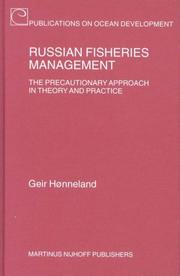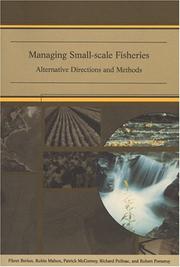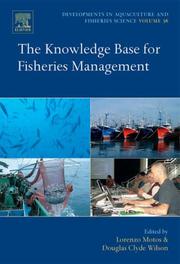| Listing 1 - 10 of 62 | << page >> |
Sort by
|
Book
ISBN: 925007509X 9789250075099 9789250075082 9250075081 Year: 2013 Publisher: Rome Food and Agriculture Organization of the United Nations
Abstract | Keywords | Export | Availability | Bookmark
 Loading...
Loading...Choose an application
- Reference Manager
- EndNote
- RefWorks (Direct export to RefWorks)
Fishery management --- Fish management --- Fisheries --- Fisheries management --- Fishery resources --- Aquatic resources --- Wildlife management --- Fish counting towers --- Overfishing --- Management
Book
ISBN: 9253076682 9789253076680 Year: 2013 Publisher: Rome
Abstract | Keywords | Export | Availability | Bookmark
 Loading...
Loading...Choose an application
- Reference Manager
- EndNote
- RefWorks (Direct export to RefWorks)
Fishery management --- Fish management --- Fisheries --- Fisheries management --- Fishery resources --- Aquatic resources --- Wildlife management --- Fish counting towers --- Overfishing --- Management
Book
ISBN: 9789253076338 925307633X 9789253073047 9253073047 Year: 2013 Publisher: Rome, Italy : Organizacion de las Naciones Unidas para la Alimentacion y la Agricultura,
Abstract | Keywords | Export | Availability | Bookmark
 Loading...
Loading...Choose an application
- Reference Manager
- EndNote
- RefWorks (Direct export to RefWorks)
"In the 20th Century, water use has increased at more than twice the rate of population growth, to the point that in many regions overall demand for water can no longer be satisfied. Agriculture uses 70 percent of global freshwater withdrawals and is probably the sector where water scarcity is most critical. Under the joint pressure of population growth and changes in dietary habits, food consumption is increasing in most regions of the world, and it is expected that by 2050 an additional 60 percent of food will be needed to satisfy global demand. Future policy decisions will increasingly need to reflect the tight linkage between water and food security, and be based on a clear understanding of opportunities and trade-offs in managing water for agricultural production. In order to guide its action in support of its member countries, FAO has recently embarked on a long-term programme on the theme "Coping with water scarcity -- the role of agriculture". Based on an expert consultation, a conceptual framework has been developed to help address the question of food security under conditions of water scarcity. This report presents the conceptual framework, reviews a series of policy and technical options, and establishes a set of principles that should serve as a basis for the development of effective food security policies in response to growing water scarcity."--Back cover.
Fishery management --- Fish management --- Fisheries --- Fisheries management --- Fishery resources --- Aquatic resources --- Wildlife management --- Fish counting towers --- Overfishing --- Management
Periodical
Abstract | Keywords | Export | Availability | Bookmark
 Loading...
Loading...Choose an application
- Reference Manager
- EndNote
- RefWorks (Direct export to RefWorks)
Aquaculture --- Fishery management --- Agricultural industry. --- Agricultural industry --- Fish management --- Fisheries --- Fisheries management --- Fishery resources --- Management --- Aquatic resources --- Wildlife management --- Fish counting towers --- Overfishing
Book
ISBN: 129920192X 0191639362 9780191639364 9780191745973 0191745979 9780199576753 0199576750 Year: 2012 Publisher: Oxford Oxford University Press
Abstract | Keywords | Export | Availability | Bookmark
 Loading...
Loading...Choose an application
- Reference Manager
- EndNote
- RefWorks (Direct export to RefWorks)
Capture fisheries make contributions to the world economy that are below their potential. Many of the world's capture fishery resources have been overexploited with some facing collapse. This book presents an overview of the current economics of capture fisheries and examines how they can achieve their full economic potential.
Fisheries --- Fishery management. --- Economic aspects. --- Fish management --- Fisheries management --- Fishery resources --- Aquatic resources --- Wildlife management --- Fish counting towers --- Overfishing --- Fishery economics --- Management --- Fishery management --- Economic aspects --- E-books

ISBN: 9004136185 9789004136182 1429407190 9781429407199 1280914793 9786610914791 9047404742 Year: 2004 Publisher: Leiden Boston Martinus Nijhoff Publishers
Abstract | Keywords | Export | Availability | Bookmark
 Loading...
Loading...Choose an application
- Reference Manager
- EndNote
- RefWorks (Direct export to RefWorks)
This book is the first comprehensive introduction to Russian fisheries management in the Western literature. It sets out the basic principles and organisational structure underlying Russian fisheries management and describes associated processes and practices, such as quota allocation, technical regulation and enforcement of fishery legislation. The book focuses attention on fisheries management at the federal level and in Russia's northern fishery basin, which is the largest fishery region in European Russia. Problems such as institutional conflict, alleged corruption and incomplete legislation on fisheries are discussed, as are the assets of scientific and technical expertise found in the country's Soviet legacy. Throughout the book, the performance of the Russian system for fisheries management is evaluated in relation to the requirements of a precautionary approach to fisheries, as set out in contemporary international law.
Fishery management --- Fish management --- Fisheries --- Fisheries management --- Fishery resources --- Aquatic resources --- Wildlife management --- Fish counting towers --- Overfishing --- Management --- Fishery management. --- Russia (Federation)

ISBN: 1280850086 9786610850082 0001552503103 1552503103 1552503011 0889369437 9780889369436 9781552503010 Year: 2001 Publisher: Ottawa, Ont., Canada
Abstract | Keywords | Export | Availability | Bookmark
 Loading...
Loading...Choose an application
- Reference Manager
- EndNote
- RefWorks (Direct export to RefWorks)
Human dependence on marine and coastal resources is increasing. Today, small-scale fisheries employ 50 of the world's 51 million fishers, practically all of whom are from developing countries. And together, they produce more than half of the world's annual marine fish catch of 98 million tonnes, supplying most of the fish consumed in the developing world. At the same time, increased fishery overexploitation and habitat degradation are threatening the Earth's coastal and marine resources. Most small-scale fisheries have not been well managed, if they have been managed at all. Existing approaches have failed to constrain fishing capacity or to manage conflict. They have not kept pace with technology or with the driving forces of economics, population growth, demand for food, and poverty. Worldwide, the management and governance of small-scale fisheries is in urgent need of reform.
Small-scale fisheries. --- Fishery management --- Artisanal fisheries --- Artisanal fishing --- Small-scale fishing --- Fisheries --- Fish management --- Fisheries management --- Fishery resources --- Aquatic resources --- Wildlife management --- Fish counting towers --- Overfishing --- Management
Book
ISBN: 9781633216402 1633216403 9781633216358 1633216357 Year: 2014 Publisher: New York
Abstract | Keywords | Export | Availability | Bookmark
 Loading...
Loading...Choose an application
- Reference Manager
- EndNote
- RefWorks (Direct export to RefWorks)
Catch share programs are a fishery management tool that dedicates a secure share of quota allowing individual fishermen, fishing cooperatives, fishing communities, or other entities to harvest a fixed amount of fish. With clearly defined fishing privileges, fishermen no longer need to ""race to fish,"" but instead can make harvest decisions based upon market conditions, improving economic performance, and weather conditions, which improves crew safety. These incentives can reduce the cost of taking conservation actions and can encourage individual fishing choices that are more consistent with
Fishery policy --- Fishery management --- Fish management --- Fisheries --- Fisheries management --- Fishery resources --- Aquatic resources --- Wildlife management --- Fish counting towers --- Overfishing --- Economic aspects --- Management --- E-books --- Economic aspects.
Book
ISBN: 9781626189942 1626189943 9781612096827 1612096824 Year: 2012 Publisher: New York
Abstract | Keywords | Export | Availability | Bookmark
 Loading...
Loading...Choose an application
- Reference Manager
- EndNote
- RefWorks (Direct export to RefWorks)
Fishery management --- Fish management --- Fisheries --- Fisheries management --- Fishery resources --- Aquatic resources --- Wildlife management --- Fish counting towers --- Overfishing --- Management --- E-books --- Fishery management.

ISBN: 9780444528506 0444528504 9780080481340 0080481345 9786611051204 1281051209 Year: 2006 Publisher: Amsterdam Elsevier
Abstract | Keywords | Export | Availability | Bookmark
 Loading...
Loading...Choose an application
- Reference Manager
- EndNote
- RefWorks (Direct export to RefWorks)
Fisheries are in a state of crisis throughout the world. While there has been some success, truly effective fisheries management seems beyond our grasp. The knowledge needed for proper management contains a broad array of facts and connections from statistical stock assessments, to the information that allows government agencies to track compliance with rules and beyond.This book describes the state-of-the-art knowledge about fishery systems. Seldom seen in a scientific publication regarding fisheries science, this book presents a multidisciplinary perspective of fisheries management.
Organization theory --- Fishery management. --- Fishery management --- Fish management --- Fisheries --- Fisheries management --- Fishery resources --- Aquatic resources --- Wildlife management --- Fish counting towers --- Overfishing --- Data processing. --- Management
| Listing 1 - 10 of 62 | << page >> |
Sort by
|

 Search
Search Feedback
Feedback About UniCat
About UniCat  Help
Help News
News